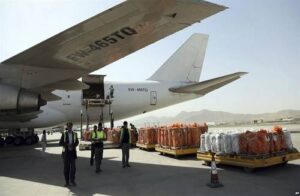KABUL (SW): The Special Inspector General of Afghanistan Reconstruction has feared that some $488 million worth of investment in Afghanistan’s oil, mining and gas industry was at risk, a report released on Tuesday April 28 said.
(SIGAR) has released an audit of the $488 million in U.S. assistance to Afghanistan's mining, oil, and gas industry, administered by DOD's Task Force for Business and Stability Operations (TFBSO), $282 million, and USAID, $206 million.
The audit found TFBSO, the State, and USAID failed to coordinate and prioritize their extractives activities, resulting in divergent strategies and poor working relationships, and creating potential sustainability problems.
The reports said that one senior official from the U.S. Embassy in Kabul stated that the embassy did not become aware of a $39.6 million TFBSO project until Afghan government officials thanked the Ambassador for U.S. support.
It added that the Afghan Ministry of Mines and Petroleum (MoMP) still lacks the technical capacity to research, award, and manage new contracts without external support.
According to the report the MoMP officials stated that, they are unaware of what USAID's Mining Investment and Development for Afghan Sustainability program training has accomplished, or will accomplish, for their staff.
Due to staff turnover and possible funding issues, it is uncertain if any of TFBSO’s or USAID’s capacity building efforts at MoMP will be sustained, the report noted.
No U.S. agency has any plans to provide continued monitoring, evaluation, or support for TFBSO extractive initiatives and there is a significant risk that TFBSO investments in developing Afghanistan’s extractive industries will go to waste, SIGAR feared.
USAID and State officials stated that their agencies would not be continuing any TFBSO initiatives because their leaderships were not interested in doing so.
Neither TFBSO nor State nor USAID adequately explained, in writing, the reasons why no TFBSO initiatives would be transferred to State or USAID, as required by the NDAA for fiscal year 2011, it added.
“USAID and State considered some TFBSO initiatives, such as the Sheberghan-Mazar Pipeline, to be liabilities due to safety concerns, lack of sustainability, and other problems.”
USAID has not developed plans detailing how the planned capacity building efforts will be sustained following the conclusion of their projects, SIGAR remarked.
One USAID official told SIGAR that it would take the U.S. government “a hundred years” to build the necessary infrastructure and fulfill training requirements to completely develop Afghanistan’s extractive industries.
According to the SIGAR, the U.S. appropriations for Afghanistan reconstruction has grown to nearly $109.8 billion, and of that amount $14.9 billion remains in the pipeline to be spent.
SIGAR's quarterly report indicated that the domestic revenues last year paid for only 33%, or $1.7 billion, of Afghanistan’s total budget expenditures of $5.2 billion, with donor contributions making up the difference.
ENDS





